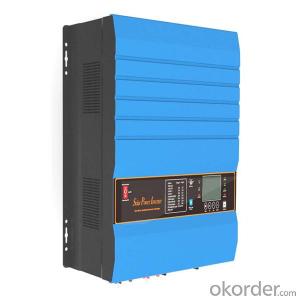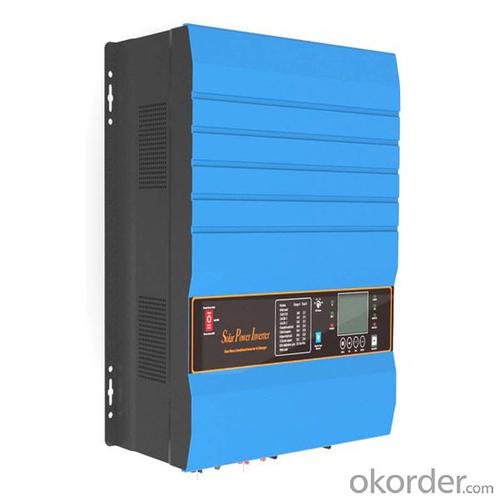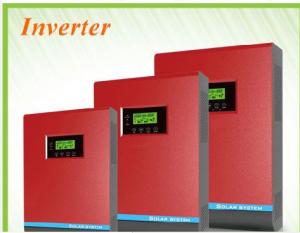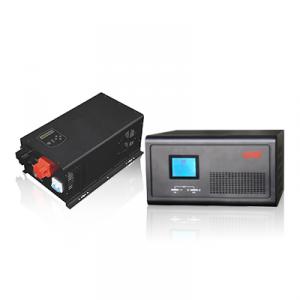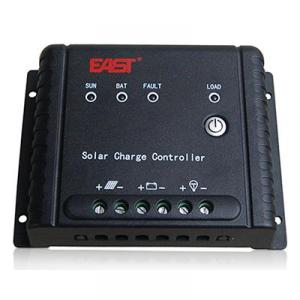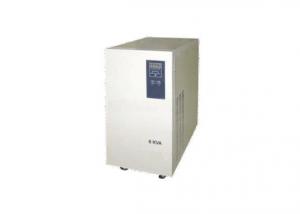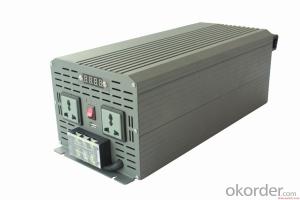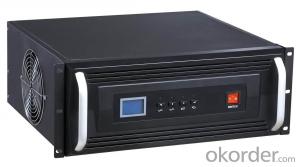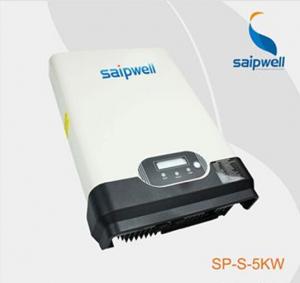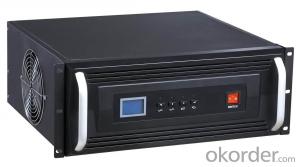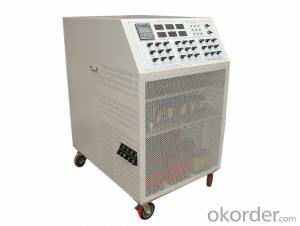10KW Pure Sine Wave Inverter New Function PV3500 Series 48V
- Loading Port:
- China main port
- Payment Terms:
- TT or LC
- Min Order Qty:
- 50 pc
- Supply Capability:
- 10000 pc/month
OKorder Service Pledge
OKorder Financial Service
You Might Also Like
Advances of Solar Inverter 10KW Pure Sine Wave Inverter New Function PV3500 Series 48V
Our solar inverters typically transfer to battery power in less than 16 milliseconds (less than 1/50th of a second).
Our solar backup electric systems use special high-quality electric storage batteries.
Main Features of Solar Inverter 10KW Pure Sine Wave Inverter New Function PV3500 Series 48V
.Power range 1kw-112kw
.12/24v/48v input optional
.Powerful Charge Rate Up to 100Amp
.Inbuilt pure copper transformer
.Pure sine wave output
.LED+LCD display
.MPPT solar charge controller 40A 45A 60A
.50/60HZ automatic sensing
.RS232 with free CD
.Battery priority function
.DC Start & Automatic Self-Diagnostic Function
.High Efficiency Design & “Power Saving Mode” to Conserve Energy
Specificationsc of Solar Inverter 10KW Pure Sine Wave Inverter New Function PV3500 Series 48V
Solar Inverter Model | 1.0KW | 1.5KW | 2.0KW | 3.0KW | 4.0KW | 5.0KW | 6.0KW | 8.0KW | 10.0KW | 12.0KW | |
Inverter output | Continuous output power | 1.0KW | 1.5KW | 2.0KW | 3.0KW | 4.0KW | 5.0KW | 6.0KW | 8.0KW | 10.0KW | 12.0KW |
Surge rating (20ms) | 3.0KW | 4.5KW | 6.0KW | 9.0KW | 12.0KW | 15.0KW | 18.0KW | 24.0KW | 30.0KW | 36.0KW | |
Output waveform | Pure sine wave/ same as input (bypass mode) | ||||||||||
Nominal efficiency | >88% (peak) | ||||||||||
Line mode efficiency | >95% | ||||||||||
Power factor | 0.9-1.0 | ||||||||||
Nominal output voltage RMS | 100-110-120VAC/220-230-240VAC | ||||||||||
Output voltage regulation | ±10% RMS | ||||||||||
Output frequency | 50Hz ± 0.3Hz / 60Hz ± 0.3Hz | ||||||||||
Short circuit protection | Yes (1sec after fault) | ||||||||||
Typical transfer time | 10ms (max) | ||||||||||
THD | < 10% | ||||||||||
DC input | Nominal input voltage | 12.0VDC / 24.0VDC / 48.0VDC | 24.0VDC /48.0VDC | 48.0VDC | |||||||
Minimum start voltage | 10.0VDC /10.5VDC for12VDC mode | *2 for 24VDC, *4 for 48VDC | |||||||||
Low battery alarm | 10.5VDC /11.0VDC for12VDC mode | ||||||||||
Low battery trip | 10.0VDC /10.5VDC for12VDC mode | ||||||||||
High voltage alarm | 16.0VDC for12VDC mode | ||||||||||
Low battery voltage recover | 15.5VDC for12VDC mode | ||||||||||
Idle consumption-search mode | <25W when power saver on. (refer to table) | ||||||||||
Charger | Output voltage | Depends on battery type (refer to table 2.5.2) | |||||||||
Charger breaker rating | 10A | 15A | 20A | 20A | 20A | 30A | 30A | 40A | 40A | 40A | |
Max charge power rate | 1/3 Rating power (refer to table 2.5.3) | ||||||||||
Battery initial voltage for start | 10-15.7VDC for 12VDC mode | *2 for 24VDC, *4 for 48VDC | |||||||||
Over charge protection S.D. | 15.7VDC for 12VDC mode | ||||||||||
BTS | Battery temperature sensor (optional) | Yes (refer to the table) Variances in charging voltage & S.D. voltage base on the battery temperature. | |||||||||
Bypass & protection | Input voltage waveform | Sine wave (grid or generator) | |||||||||
Nominal voltage | 110VAC | 120VAC | 220VAC | 230VAC | 230VAC | ||||||
Max input AC voltage | 150VAC for 120VAC LV mode; 300VAC for 230VAC HV mode. | ||||||||||
Nominal input frequency | 50Hz or 60Hz | ||||||||||
Low freq trip | 47 ± 0.3Hz for 50Hz; 57 ± 0.3Hz for 60Hz | ||||||||||
High freq trip | 55 ± 0.3Hz for 50Hz; 65 ± 0.3Hz for 60Hz | ||||||||||
Overload protection (SMPS load) | Circuit breaker | ||||||||||
Output short circuit protection | Circuit breaker | ||||||||||
Bypass breaker rating | 10 | 15 | 20 | 30 | 40 | 40 | 40 | 50 | 63 | 63 | |
Transfer switch rating | 30Amp for UL & TUV | 40Amp for UL | 80Amp for UL | ||||||||
Bypass without battery connected | Yes (optional) | ||||||||||
Max bypass current | 30Amp | 40Amp | 80Amp | ||||||||
Solar charger | Rated voltage | 12.0VDC / 24.0VDC / 48.0VDC | |||||||||
Solar input voltage range | 15-30VDC / 30-55VDC / 55-100VDC | ||||||||||
Rated charge current | 40-60A | ||||||||||
Rated output current | 15A | ||||||||||
Self consumption | <10mA | ||||||||||
Bulk charge (default) | 14.5VDC for12VDC mode | *2 for 24VDC, *4 for 48VDC | |||||||||
Floating charge (default) | 13.5VDC for12VDC mode | ||||||||||
Equalization charge (default) | 14.0VDC for12VDC mode | ||||||||||
Over charge disconnection | 14.8VDC for12VDC mode | ||||||||||
Over charge recovery | 13.6VDC for12VDC mode | ||||||||||
Over discharge disconnection | 10.8VDC for12VDC mode | ||||||||||
Over discharge reconnection | 12.3VDC for12VDC mode | ||||||||||
Temperature compensation | -13.2mVDC/℃ for12VDC mode | ||||||||||
Ambient temperature | 0-40℃ (full load) 40-60℃ (derating) | ||||||||||
Mechanical specifications | Mounting | Wall mount | |||||||||
Inverter dimensions (L*W*H) | 388*415*200mm | 488*415*200mm | 588*415*200mm | ||||||||
Inverter weight (solar chg) KG | 21+2.5 | 22+2.5 | 23+2.5 | 27+2.5 | 38+2.5 | 48+2.5 | 49+2.5 | 60+2.5 | 66+2.5 | 70+2.5 | |
Shipping dimensions (L*W*H) | 550*520*310mm | 650*520*310mm | 750+520+310mm | ||||||||
Shipping weight (solar chg) KG | 23+2.5 | 24+2.5 | 25+2.5 | 29+2.5 | 40+2.5 | 50+2.5 | 51+2.5 | 62+2.5 | 68+2.5 | 72+2.5 | |
Display | LED+LCD | ||||||||||
Standard warranty | 1 year | ||||||||||
Pictures of Solar Inverter 10KW Pure Sine Wave Inverter New Function PV3500 Series 48V
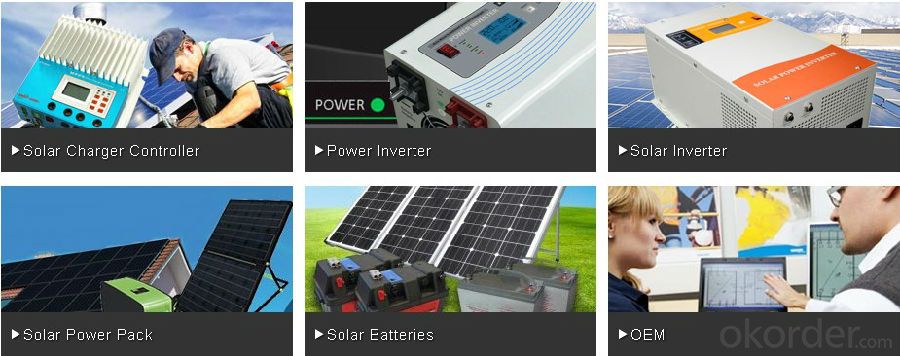
Solar Inverter's Application
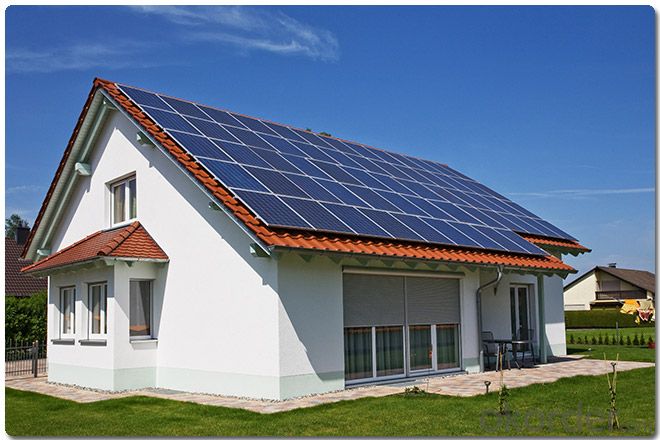
Warranty of Solar Inverter 10KW Pure Sine Wave Inverter New Function PV3500 Series 48V
OKorder’s Products provides a 1~3 year limited warranty (“Warranty”) against defects in materials and workmanship for its Uninterruptible power supply, Power inverter/chargers, Solar charge controllers, Battery Products (“Product”).
The term of this Warranty begins on the Product(s) initial purchase date, or the date of receipt of the Product(s) by the end user, whichever is later.
This must be indicated on the invoice, bill of sale, and/or warranty registration card submitted to MUST-Solar.
This Warranty applies to the original MUST-Solar Product purchaser, and is transferable only if the Product remains installed in the original use location.
Certificates of Solar Inverter 10KW Pure Sine Wave Inverter New Function PV3500 Series 48V
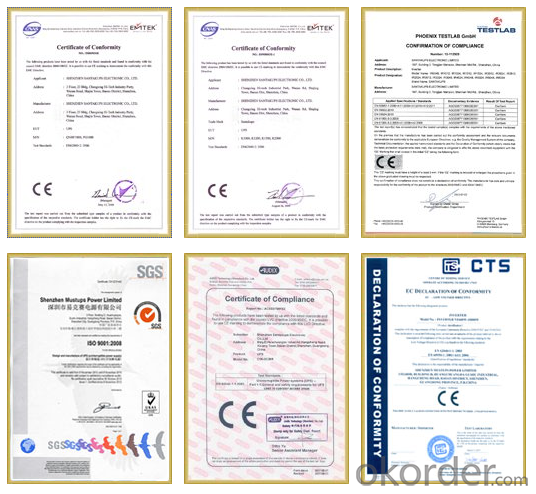
FAQ of Solar Inverter 10KW Pure Sine Wave Inverter New Function PV3500 Series 48V
How to guarantee the quality of the products?
We have established the international advanced quality management system,every link from raw material to final product we have strict quality test;
We resolutely put an end to unqualified products flowing into the market.
At the same time, we will provide necessary follow-up service assurance.
How long can we receive the product after purchase?
In the purchase of product within three working days, We will arrange the factory delivery as soon as possible.
- Q: Can a solar inverter be used with a solar-powered lighting system?
- Yes, a solar inverter can be used with a solar-powered lighting system. A solar inverter is responsible for converting the direct current (DC) energy generated by the solar panels into usable alternating current (AC) electricity. This AC electricity can then be utilized by the lighting system for illumination.
- Q: Can a solar inverter be used with different types of solar panels?
- Yes, a solar inverter can typically be used with different types of solar panels. Solar inverters are designed to convert the direct current (DC) generated by solar panels into alternating current (AC) that can be used to power various electrical devices. As long as the solar panels produce compatible DC voltage and current, they can be connected to the solar inverter regardless of their type, such as monocrystalline, polycrystalline, or thin-film panels. However, it is important to ensure that the solar inverter is appropriately sized and compatible with the total capacity of the connected solar panels for optimal performance.
- Q: How does a solar inverter convert DC to AC?
- A solar inverter converts direct current (DC) electricity generated by solar panels into alternating current (AC) electricity that can be used to power appliances and feed into the electrical grid. It does this by using a complex electronic circuit that first converts the DC power into high-frequency AC power. This high-frequency AC power is then transformed into the desired voltage and frequency of standard AC power using pulse-width modulation techniques. The converted AC power can then be utilized for various household or commercial electrical needs.
- Q: What is the purpose of a solar inverter?
- The purpose of a solar inverter is to convert the direct current (DC) electricity generated by solar panels into alternating current (AC) electricity that can be used to power household appliances or be fed back into the electrical grid.
- Q: Can a solar inverter be used in a solar-powered irrigation system?
- Yes, a solar inverter can be used in a solar-powered irrigation system. A solar inverter is responsible for converting the direct current (DC) produced by solar panels into alternating current (AC), which is necessary for powering electrical devices such as pumps and motors in an irrigation system. By connecting the solar panels to a solar inverter, the energy generated by the sun can be efficiently utilized to operate the irrigation system, making it a sustainable and cost-effective solution for agricultural purposes.
- Q: How do you monitor the performance of a solar inverter?
- To monitor the performance of a solar inverter, several methods can be employed. Firstly, real-time monitoring of key parameters such as voltage, current, and power output can be done using specialized monitoring devices or software. These tools provide a comprehensive overview of the inverter's performance, allowing for immediate identification of any issues or deviations from expected performance. Additionally, regular inspection and maintenance checks are crucial for performance monitoring. This involves visually inspecting the inverter for any physical damage or abnormalities, as well as checking the connections and wiring. Any signs of wear or malfunction should be promptly addressed to ensure optimal performance. Furthermore, data logging and analysis play a vital role in monitoring the inverter's performance over time. By collecting and analyzing historical data, trends and patterns can be identified, helping to detect potential issues or performance degradation. This can be done using software platforms that track and analyze the data from the inverter. Overall, a combination of real-time monitoring, regular inspections, and data analysis allows for effective performance monitoring of solar inverters, ensuring their optimal functioning and addressing any performance issues promptly.
- Q: What is the role of power ramp rate control in a solar inverter?
- The role of power ramp rate control in a solar inverter is to ensure a smooth and controlled increase or decrease in power output from the solar panels. This control mechanism is important to prevent sudden changes in power generation that can lead to instability in the electrical grid. By gradually adjusting the power output, the solar inverter helps to maintain grid stability, avoid voltage and frequency fluctuations, and ensure a reliable and consistent energy supply.
- Q: Can a solar inverter be used with a solar-powered telecommunications system?
- Yes, a solar inverter can be used with a solar-powered telecommunications system. A solar inverter is an essential component of a solar-powered system as it converts the direct current (DC) generated by solar panels into alternating current (AC) that can be used to power various electrical devices, including telecommunications equipment. By using a solar inverter, the solar-generated electricity can be efficiently utilized to run a telecommunications system, making it a sustainable and environmentally-friendly solution.
- Q: Can a solar inverter be used with solar-powered irrigation systems?
- Yes, a solar inverter can be used with solar-powered irrigation systems. A solar inverter is used to convert the direct current (DC) electricity produced by solar panels into alternating current (AC) electricity that can be used to power various devices, including irrigation systems. By using a solar inverter, the solar energy generated by the panels can be efficiently utilized to power the irrigation system, making it a sustainable and environmentally friendly solution.
- Q: Can a solar inverter be used with solar-powered ventilation systems?
- Yes, a solar inverter can be used with solar-powered ventilation systems. The solar inverter is responsible for converting the direct current (DC) generated by the solar panels into alternating current (AC) that can be used to power various devices and systems, including ventilation systems. By connecting the solar panels to the solar inverter, the AC energy produced can be used to operate the ventilation system, making it an efficient and eco-friendly solution.
Send your message to us
10KW Pure Sine Wave Inverter New Function PV3500 Series 48V
- Loading Port:
- China main port
- Payment Terms:
- TT or LC
- Min Order Qty:
- 50 pc
- Supply Capability:
- 10000 pc/month
OKorder Service Pledge
OKorder Financial Service
Similar products
Hot products
Hot Searches
Related keywords
